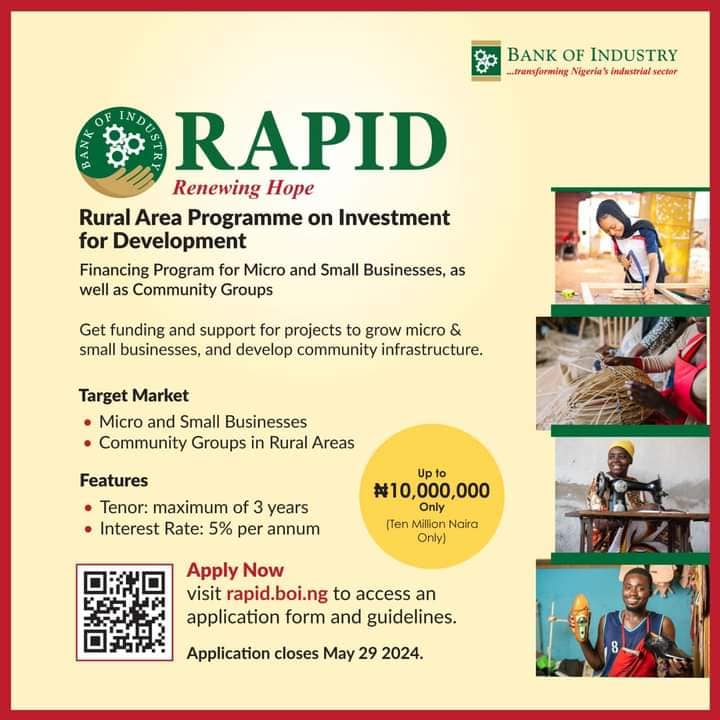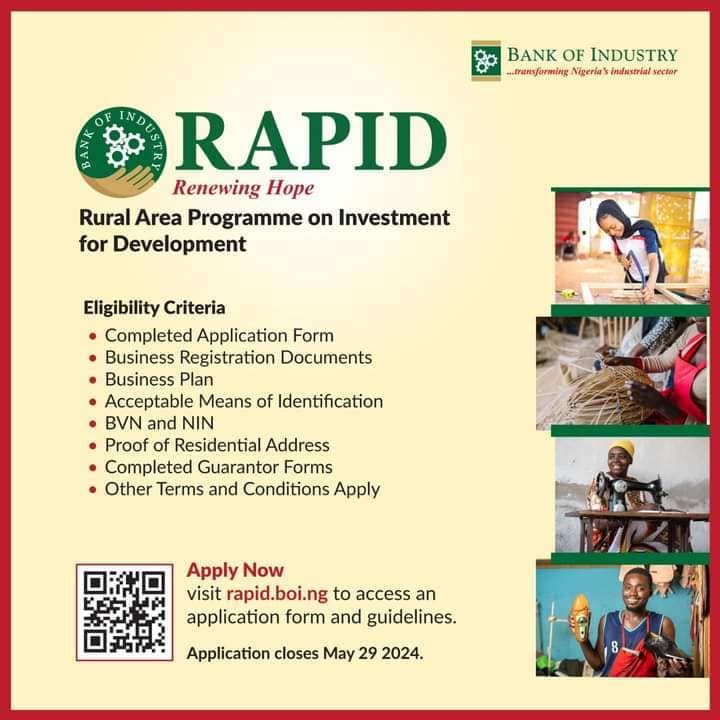Top 30 Business Ideas and sectors that can apply for N10 million Loan of BOI RAPID Scheme
The types of businesses that can apply for a Bank of Industry (BOI) loan under the RAPID (Rural Acquisition and Productivity Improvement Development) scheme are those engaged in value-adding activities, specifically excluding trading and traditional farming.
The Beneficiaries would be eligible for a loan of a maximum of N10 million to acquire plants/machinery and raw material for their day to day operations.
RAPID shall provide support in value-adding activities excluding trading and farming. These include activities in manufacturing, agribusiness, processing, and other ventures contributing to economic diversification and job creation in rural areas.
 Apply for Up to N10million from BOI and pay back within 3 years
Apply for Up to N10million from BOI and pay back within 3 years
The eligible sectors include:
1. Manufacturing:
a. Textile and garment production.
b. Furniture and woodworking.
c. Food and beverage manufacturing.
d. Chemical production.
e. Pharmaceutical manufacturing.
f. Metal fabrication and machinery production.
2. Agribusiness and Processing:
a. Agro-processing (e.g., turning raw agricultural products into finished goods).
b. Food processing and packaging.
c. Production of agricultural equipment.
d. Dairy processing.
e. Meat and poultry processing.
f. Fish processing and packaging.
g. Cassava Processing
3. Processing
Food Processing:
a. Fruit and Vegetable Canning: Processing and canning fruits and vegetables.
b. Juice and Beverage Production: Making fruit juices, smoothies, and other beverages.
c. Dairy Processing: Producing cheese, yogurt, butter, and other dairy products.
d. Meat Processing: Producing sausages, cured meats, and other meat products.
e. Grain Milling: Milling grains to produce flour, cornmeal, and other products.
f. Snack Production: Making chips, popcorn, nuts, and other snacks.
g. Bakery Products: Producing bread, pastries, and other baked goods.
h. Spice and Herb Processing: Drying, grinding, and packaging spices and herbs.
4. Agro-Processing:
a. Oil Extraction: Extracting oils from seeds like palm, sunflower, and groundnut.
b. Rice Milling: Processing rice from paddy to polished rice.
c. Cassava Processing: Making products like garri, tapioca, and cassava flour.
d. Sugar Processing: Refining raw sugar from sugarcane or sugar beets.
e. Tea and Coffee Processing: Drying, roasting, and packaging tea and coffee.
f. Cocoa Processing: Making cocoa butter, cocoa powder, and chocolate.
5. Seafood Processing:
a. Fish Processing: Cleaning, filleting, and packaging fish.
b. Shrimp and Shellfish Processing: Cleaning, cooking, and packaging shrimp and shellfish.
6. Textile Processing:
a. Cotton Ginning and Spinning: Processing raw cotton into yarn and thread.
b. Dyeing and Printing: Dyeing fabrics and printing designs on textiles.
c. Weaving and Knitting: Producing fabrics from yarns through weaving or knitting.
7. Wood Processing:
a. Sawmilling: Cutting logs into lumber.
b. Furniture Making: Crafting furniture from processed wood.
c. Pulp and Paper Production: Making paper products from wood pulp.
8. Metal Processing:
a. Steel Fabrication: Processing steel into various shapes and products.
b. Metal Casting: Melting and casting metal into specific forms and shapes.
c. Machining and Tooling: Producing tools and parts from metal.
9. Plastic and Rubber Processing:
a. Plastic Recycling: Processing waste plastic into reusable forms.
b. Rubber Products Manufacturing: Producing items like tires, belts, and hoses from rubber.
10. Chemical Processing:
a. Soap and Detergent Manufacturing: Producing soaps, detergents, and cleaning agents.
b. Fertilizer Production: Manufacturing organic and inorganic fertilizers.
c. Paint and Coatings Production: Making paints, varnishes, and protective coatings.
11. Renewable Energy Processing:
a. Biofuel Production: Processing biomass into biofuels like biodiesel or ethanol.
b. Biogas Production: Converting organic waste into biogas for energy.
12. Pharmaceutical Processing:
a. Herbal Medicine Processing: Extracting and processing medicinal herbs into products.
b. Generic Drug Manufacturing: Producing generic pharmaceutical products.
13. Construction Materials Processing:
a. Brick and Tile Manufacturing: Producing bricks, tiles, and other construction materials.
b. Cement and Concrete Production: Making cement, concrete, and related products.
14. Leather Processing:
a. Tanning: Processing raw hides into leather.
b. Leather Goods Manufacturing: Producing items like shoes, bags, and belts from leather.
15. Agricultural Equipment Manufacturing:
a. Farm Machinery Production: Producing tractors, plows, and other farming equipment.
b. Irrigation Equipment Manufacturing: Making drip irrigation systems, sprinklers, and pumps.
These processing ideas involve transforming raw materials into finished or semi-finished products, adding value and creating opportunities for economic growth and job creation in rural areas.
Other ventures contribute to economic diversification and job creation in rural areas.
Here are additional ventures that contribute to economic diversification and job creation in rural areas, beyond traditional processing:
16. Renewable Energy Production:
a. Solar Power Farms: Establishing solar energy farms to generate electricity.
b. Wind Energy Projects: Setting up wind turbines for power generation.
c. Micro-Hydro Projects: Developing small-scale hydroelectric power plants.
17. Waste Management and Recycling:
a. Recycling Centers: Establishing facilities for recycling plastic, metal, paper, and electronic waste.
b. Composting Plants: Creating compost from organic waste for agricultural use.
c. Waste-to-Energy Projects: Converting waste materials into usable energy.
18. Water Resource Management:
a. Rainwater Harvesting Systems: Installing systems to collect and store rainwater.
b. Irrigation Projects: Developing irrigation infrastructure to support agriculture.
c. Water Purification and Distribution: Providing clean drinking water to rural communities.
19. Health and Wellness Services:
a. Rural Health Clinics: Establishing healthcare centers to provide medical services.
b. Mobile Health Units: Operating mobile clinics to reach remote areas.
c. Wellness Centers: Creating centers offering fitness, mental health, and wellness services.
20. Educational Services:
a. Vocational Training Centers: Offering skills training in trades like carpentry, tailoring, and mechanics.
b. E-Learning Hubs: Providing internet access and digital learning resources.
c. Community Libraries: Establishing libraries with books, computers, and educational materials.
21. Artisanal and Craft Production:
a. Handmade Goods Workshops: Producing traditional crafts, pottery, and textiles.
b. Jewelry Making: Crafting and selling handmade jewelry.
c. Art Galleries and Studios: Creating spaces for local artists to produce and showcase their work.
22. Digital and IT Services:
a. Rural BPO Centers: Setting up business process outsourcing centers to provide customer service and back-office functions.
b. IT Training Institutes: Offering courses in coding, digital marketing, and other IT skills.
c. E-Commerce Platforms: Developing online marketplaces for rural artisans and farmers to sell their products.
23. Transportation and Logistics:
a. Rural Transport Services: Operating transport services to connect rural areas with urban centers.
b. Cold Chain Logistics: Developing refrigerated transport systems for perishable goods.
c. Courier and Delivery Services: Setting up local courier services for goods and parcels.
24. Fashion and Design:
a. Rural Fashion Brands: Designing and producing clothing and accessories using local materials and traditional techniques.
b. Textile Printing and Dyeing: Setting up small-scale printing and dyeing units for fabrics.
c. Tailoring and Alteration Services: Providing custom tailoring and garment alteration services.
These ventures not only help diversify the rural economy but also create numerous job opportunities, thereby enhancing the economic stability and growth of rural areas.
 Apply for Up to N10million from BOI and pay back within 3 years
Apply for Up to N10million from BOI and pay back within 3 years
25. Small-Scale Manufacturing:
a. Textile and Garment Production: Small garment factories, weaving units, or textile mills needing machinery like sewing machines, looms, and raw materials such as fabric and thread.
b. Furniture Making: Small workshops producing wooden or metal furniture, requiring machinery such as saws, drills, lathes, and raw materials like wood, metal, and finishing supplies.
c. Food and Beverage Manufacturing: Small food processing units producing snacks, beverages, or packaged foods, needing equipment such as mixers, ovens, packaging machines, and raw materials like grains, fruits, and packaging materials.
26. Agribusiness and Processing:
a. Agro-Processing Units: Small units processing agricultural products such as rice milling, cassava processing, or oil palm processing, requiring equipment like grinders, presses, and raw materials like harvested crops.
b. Dairy Processing: Small dairy plants producing cheese, yogurt, or other dairy products, needing pasteurizers, homogenizers, and raw materials like milk.
c. Meat and Poultry Processing: Small abattoirs or poultry processing units requiring slaughtering equipment, cold storage, and raw materials like livestock.
27. Renewable Energy Projects:
a. Solar Panel Assembly: Small assembly plants for solar panels needing assembly lines, soldering equipment, and raw materials like solar cells and glass.
b. Biomass Energy Production: Small units producing biomass energy products like briquettes or pellets, requiring pelletizers, dryers, and raw materials like agricultural waste.
28. Creative Industries:
a. Handicrafts Production: Small workshops producing handmade items like pottery, jewelry, or textiles, needing kilns, crafting tools, and raw materials like clay, beads, and fabrics.
b. Artisanal Furniture: Small-scale production of handcrafted furniture requiring woodworking tools, polish, and raw materials like timber.
29. Construction and Building Materials:
a. Brick Making: Small brick-making units requiring brick-making machines, molds, and raw materials like clay and cement.
b. Tile Production: Small tile manufacturing units needing tile presses, kilns, and raw materials like clay and glaze.
30. Health and Wellness:
a. Pharmaceutical Production: Small units producing generic drugs or herbal medicines, requiring mixing machines, tablet press machines, and raw materials like active pharmaceutical ingredients (APIs) and excipients.
b. Cosmetics Production: Small-scale production of soaps, creams, or lotions, needing mixing equipment, filling machines, and raw materials like essential oils, bases, and packaging materials.
31. ICT and Technology:
a. Hardware Assembly: Small units assembling computers or mobile phones needing assembly lines, testing equipment, and raw materials like circuit boards and casings.
b. Software Development: Small firms developing software applications needing computers, servers, and related equipment and software licenses.
32. Educational Materials:
a. School Supplies Production: Small units producing notebooks, pens, or educational kits, requiring printing machines, binding equipment, and raw materials like paper and ink.
33. Environmental Services:
a. Recycling Plants: Small recycling units for plastic, paper, or metal requiring shredders, balers, and raw materials like recyclable waste.
b. Water Purification Systems: Small units producing water filters or purification systems needing molding machines, filters, and raw materials like activated carbon.
If you need a business plan to apply for this loan call or whatsapp 08060779290
Related